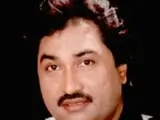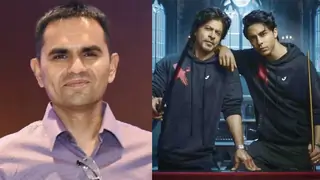Despite knowing that comparisons generally glorify one and belittle the other, comparisons are inevitable in a social world. It's 'relativity', as they say. However, there are a few people who simply cannot be compared with anyone. Such are the people we call 'inimitable'. The Indian composer A.R. Rahman is in that league of the extraordinary. Rahman's greatness does not even rest on comparison with others in the Bollywood musical scene because he is much ahead anyway. Some singers look good against the bad. Rahman does not however, need a dark background to look brighter. He is of the stature of Pt. Ravi Shankar or perhaps even higher, at least, in terms of his recognition by the world and the accolades showered on him.
I was, in fact, incredulous to see Rahman being compared to a 90s Bollywood singer Sanu, by someone on Facebook. There's simply no comparion. I can't help it if this blog shows a definite bias towards one artist against another. However, the very context of this writing is of a confrontational nature because of a person who was unfairly criticizing Rahman.
Rahman has consistently come up with melodies (or 'dhun') that has done justice to shades of emotional intensities. Just to give an example of his two songs, 'Tu Bin Bulaaye' and 'Saathiya' has a kind of mesmerising devotion to love. His music also accentuates the situation and storyline (such as, in the movie Delhi-6). If his songs like "Kehna Hi Kya" and "Chupke Se Lag Jaa Gale" (both sung by the dulcet Chitra) have that qawaali-like chorus, his song 'Jiya Jale' is a unique classical blend of Hindi and Malayalam.
Rahman manages to subtlize the underlying emotions through his use of various undertones, and at the same time, he does not make his orchestration confusing, as what we find in pop remixes and DJ-vomited tracks. He is clear about what he wants to do with a song. He, of course, has a trademark electronica style with an eclectic flavour and an ethereal feel (like, in songs of Roja). It distinguishes him from others while he manages to come up with one great tune, theme and orchestration after another. But experts also acknowledge Rahman's natural tendency to experiment with various musical genres, flavours, themes, styles and forms, as much as with fusion-based music involving multi-layered orchestrations, with both traditional Indian instruments and the Western ones.
More about Rahman the Great:
Rahman is a world-renowned musical icon. If you check Rahman's record, you'll see it is but enviable: fourteen Filmfare Awards, four National Film Awards, a BAFTA Award, a Golden Globe, two Grammy Awards, and two Academy Awards, as of 2010. The "Mozart of Madras" has sold over 200 million cassettes, making him one of the world's all-time top selling recording artists. He is also in Time magazine's list of World's 100 Most Influential People. His song "Jai Ho" reached #2 on the Eurochart Hot 100 Singles.
Rahman's style of music is symphonic orchestral themes, with improvised layers of instrumentation (including Indian traditional instruments), and fusion-based syncretic experimentation with new electronic sounds. He moulds popular Indian film industry music with unique tones and forms, allowing for a broad range of lyrics encompassing regional cultures, accomodating even Gulzar's free verse in 'Dil Se'. If the music of Roja had that Tamil tonal flavour marked by techno instrumentation and a distant mountain chorus feel in 'Yeh Haseen Vadiyaan' or that locust-shrill quiet-night moony melody of "Chupke Se Lag Jaa Gale", his score in Bombay was emotional and haunting, such as that humane and sober Bombay theme rendered in flute. His songs have that spirit of triumphant dynamic beat, tonal diversity and a profound sense of humanity.
Who is Kumar Sanu?
On the other hand, you have Kumar Sanu, a monotonous nasal-toned singer of the 1990s with a limited range. His name might bring to your mind those masala romantic numbers of that decade. His songs, starting from the 'Aashiqui' days, had that same style--like that of a college lover's ultra-romanticized crooning. Although he got some good melodic songs also, he would almost screw them all with his nose. If his rendered songs like "Jab Koi Baat Bigad Jaaye" sound good, it is because of the composition rather than the singing. (By the way, it was not an original Rajesh Roshan composition either.)
You see, the departure of Kishore Kumar had left a big void in Bollywood's musical scene and even a great composer like R.D. Burman was left with no choice but to take a second-grade Kishore copycat for his superb work in '1942- A Love Story". I wish Kishore had sung those songs, those songs would have been just mind-blowing in his rich voice.
If Rafi's parting from the world brought not-very-likeable unoriginal singers like Mhd. Aziz and Shabbir Kumar to the fore, Kumar Sanu was born off the dust where Kishore the Great had set foot and made an indelible mark. Anu Malik used to work with Sanu for his tough voice but then Anu Malik would actually try to curb Sanu's tendency to cheapen his voice by transferring the high notes to his nasal regions. This is how songs "Yeh Ujli Chandni" or "Sun Sun Sun" (from the movie Sir) came out good, and I am obliged to keep them in my collection! Often, Sanu also had the habit of unnecessary trying to prolong a note or impart an unnecessary vibrato spin (harkat) to it. Another Sanu song I have "Ho Jaata Hai Kaise Pyaar" (from the movie Yalgaar)"music is quite good (by some unknown music director, Channi Singh) but the way Sanu nasalises and demonises the word 'pyaar' leaves me bedeviled. Aise gaata hai ki jaise Pyaar' nahin koi atyachaar' ho gaya ho! (I mean, "His rendition of the word pyaar or love' sounded more like an torture"). Obviously, that unknown Channi Singh did not have the power to stop the vocal air flowing from Sanu's nose.
A.R. Rahman has won two Academy Awards for Best Original Music Score and Best Original Song and two Grammy Awards, for Best Compilation Soundtrack Albumand Best Song Written for a Visual Media. This is an unprecedented remarkable feat at the international level. On the national level, we know he was conferred the Padma Shri and the Padma Bhusan, and he's won numerous other awards regularly, like the Filmfare, etc. Rahman also is a regular performer at international-level concerts, like the illustrious Pt. Ravi Shankar.
























3